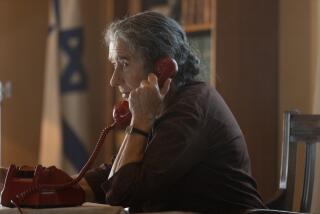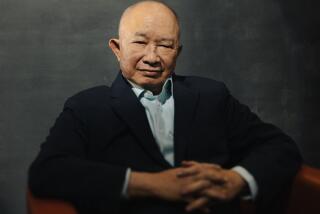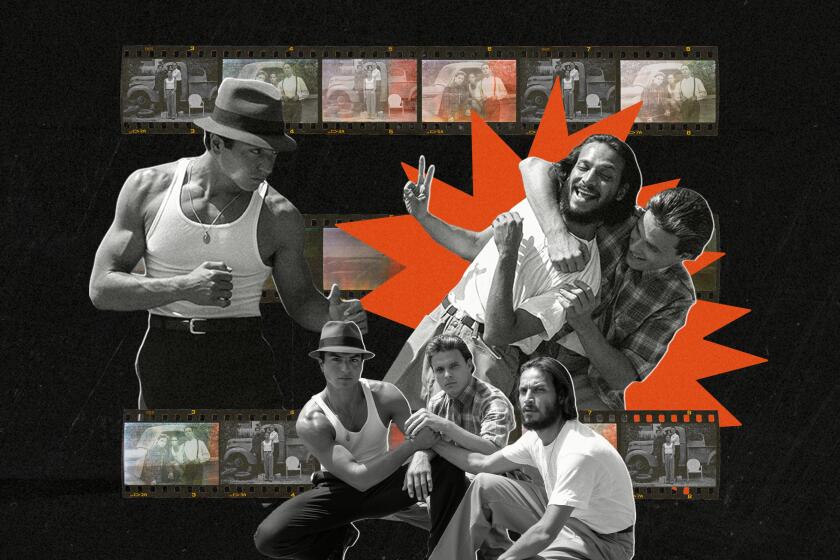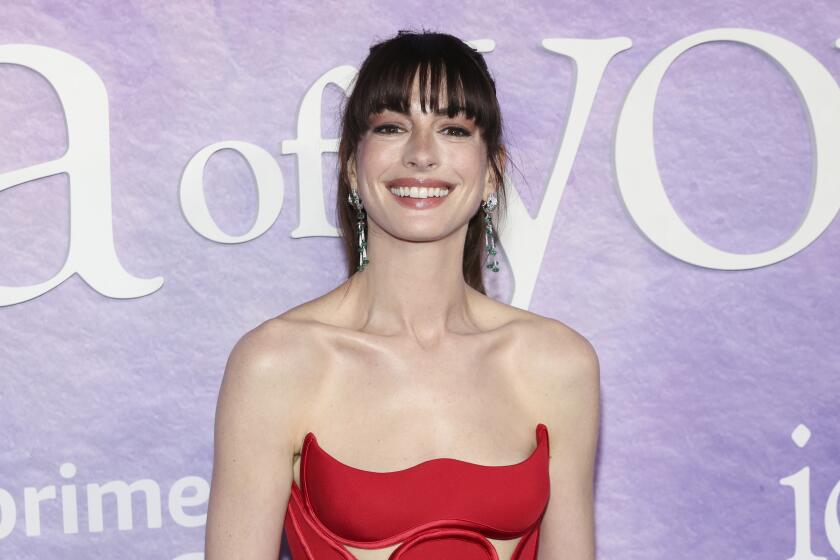GUINNESS GALA TRIBUTE SET TONIGHT
For a man who is considered to be one of the world’s greatest film actors, a consummate character actor and a master of disguises, Sir Alec Guinness could have been playing the humblest of roles as he prepared to accept yet another honor of his 40-year-long career.
“It’s all very splendid, I’m delighted--and surprised,” said the usually eloquent actor, searching for the right words to describe his feelings about being the subject of a tribute for “distinguished contribution to the art of film” to be presented here tonight by the prestigious Film Society of Lincoln Center.
“I find it odd that I’ve been asked, really. I know this sounds like false modesty, but I don’t think I pass as a film star. . . . I don’t think I am . . . no, I’m not,” he said, definitely.
“To be a film star, you have to dedicate yourself to that. It’s the sort of life that stems from Hollywood; I haven’t lived that sort of life,” said Guinness, 73, noting he has divided his career between films and stage, mostly working in England, where he and his wife live in the countryside south of London.
“As a kid, all I wanted to be was an actor, and that’s been my continued ambition,” he said.
In fact, Guinness has been a major international film star since making his film debut in 1946 in David Lean’s “Great Expectations.” The English actor, who was knighted by Queen Elizabeth II in 1959, received an Academy Award as best actor in 1957 for his performance in “The Bridge Over the River Kwai” and a second “honorary” Oscar in 1979 for “advancing the art of screen acting.” In 1977, his appearance in “Star Wars” introduced him to a new generation of film-goers and earned him another Oscar nomination.
Said Wendy Keys, Film Society program director: “The fact that he’s not tried to be a movie star in the conventional sense is a tribute to him as a person and as an actor, and is reflected in the enduring quality of his work.”
Tonight’s tribute, an annual fund-raiser for the Film Society, ranks with its other major annual event, the New York Film Festival, as a highlight of the film season here; last year’s honoree was Elizabeth Taylor. As in the past, the program is expected to consist of film clips and reminiscences by Guinness’ friends and colleagues.
Among those scheduled to appear on stage at Avery Fisher Hall are actors and directors who, like Guinness, span modern film history: John Mills, who co-starred with Guinness in “Great Expectations”; Glynis Johns (“The Promoter,” 1952); Mark Hamill (“Star Wars”); Vincent Price, a longtime friend.
Dressed meticulously and seeming serious on the surface, Guinness was disarmingly and devilishly witty and clever--an amalgam of the characters he has played--as he spoke directly and without pretense about his career and reluctantly about acting. He said he was “bullied” into writing his memoirs, published last year and reissued in paperback as “Blessings in Disguise,” and then only on condition he would write about other famous artists he has worked with rather than concentrating on himself.
Although Guinness said working in films “has made me a better stage actor,” he was modest, sometimes critical, even denigrating about some of his best-known, most-admired work in films. Of one of his earliest successes, playing multiple roles, including a woman, in the 1949 film “Kind Hearts and Coronets,” he said: “My own work was pretty crude, pretty much cardboard.” Of his Oscar-winning performance as a British officer in “The Bridge Over the River Kwai,” he said: “The film was very beneficial to me, and the film was very good, but I thought my character was really nonsense.”
Guinness said he appreciated the role of Obi-wan Kenobi, in “Star Wars,” for “introducing me to a new generation and keeping my name out front a bit” at a time of slump in the British film industry. “You know, all the attention and even the Oscars don’t mean much. After ‘Kwai,’ I got a string of offers to play tiresome old officers and after ‘Star Wars,’ it was a string of Guru-like figures in outer space . . . which is not my idea of progress.
“People often say, ‘Why don’t you try to make more of those early kind of comedies?’ ” continued Guinness, referring to the sophisticated satires he made at Britain’s Ealing Studios in the late 1940s and early ‘50s, such as “The Lavender Hill Mob,” which first made him popular with American film audiences. “But that’s the last thing I’d want to repeat,” he said.
His most recent film is “Little Dorrit” from the Charles Dickens novel, in which he plays “a feckless, vain, silly, petulant, but kindly man who fails to learn from his mistakes.” The experience working on the British-made film last year was “the most enjoyable job I’ve ever had in films,” but he said its 5 1/2-hour length limited distribution.
Guinness said he never “planned” or “tried to work out” his film career. “I’ve just taken it as it has come,” he said, insisting that he never even considered a career in Hollywood, after his first experience in the American film industry, in 1956 in “The Swan.”
He said he has worked less in films in recent years, and turned his attention to British television specials such as “Tinker, Tailor, Soldier, Spy,” because British films have not been plentiful and because “the offers from Hollywood have not been very appealing. I also need to take longer breaks to catch my breath,” he said, not very convincing in his reference to “advancing age. I do like a challenge, but I also have other interests . . . a home life, a wife, animals.
“At 20, I suppose I saw my name in huge lights as a vision of what life might be, but this is a ridiculous, very limited, very boring, childish ambition,” he said, adding, half-jokingly, that he had soon advanced to the stage of “world-weary achiever.
“Now, I’d just like to do another British movie I’d be proud of--or two or three.”
More to Read
Only good movies
Get the Indie Focus newsletter, Mark Olsen's weekly guide to the world of cinema.
You may occasionally receive promotional content from the Los Angeles Times.






